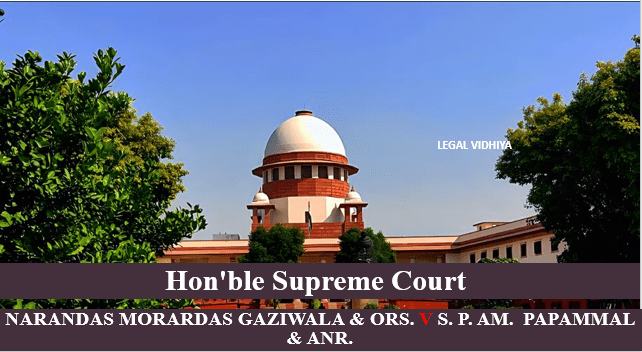
| Citation | 1967 AIR 333, 1966 SCR 38 |
| Date of Judgement | 25/03/1996 |
| Court | Supreme Court |
| Case type | Civil |
| Appellant | Narandas Morardas Gaziwala & Ors. |
| Respondent | S.P. Am. Papammal |
| Bench | Ramaswami, V., Subbarao, K. |
| Referred | Indian Evidence Act, 1872, s. 92, Provision 32 |
FACTS OF THE CASE
NM Gaziwala, the plaintiff, was in a partnership with Krishna and co. Krishna and co. were acting as their agents giving off their goods on sale on commission. The appellant, is a company based in Surat famous for dealing in silver thread and lace. Krishna and company sold their goods on commission mainly in three districts of Madras. M. Chettiar, dissolves all of the firm’s assets resulting in Krishna and Co. becoming indebted. M. Chettiar (hereafter referred to as the plaintiff) signed a promissory note in the amount of Rs. 7,500/-, which Krishna & Co. found to be due and payable, in favour of Narandas Morardas Gaziwala. A claim was filed by the plaintiff in Kancheepuram’s District Munsif Court having a request to be renditioned accounts dating back to the day where M. Chettiar executed a promissory note by the suit dated of the same in order to make sure of the amount owed to him. In response to that, the Surat-based company has filed a lawsuit against the plaintiffs in the Chinguruput Court of subordinate judge for recovery of unpaid amounts under promissory notes. The parties have agreed to hear both cases simultaneously.
ISSUES
1. Is the plaintiff, as the agent, authorised to bring a lawsuit against the defendant-Surat company for accounts?
2. Whether the plaintiff is entitled to set up a parole assertion to demonstrate the condition point of reference as to the enforceability of the promissory note?
ARGUEMNTS
Appellant-
• The Surat-based company evaded the terms of solitary agency agreements and sold privately through other companies or directly to customers in those regions. • The Surat Office has agreed that under this solitary agency agreement, the liability under the promissory note will be adjusted to match the fees that can be earned.
Respondent-
• The plaintiff is barred from entering into a probation contract by the provision of s. Section 92 of the Evidence Act. The agreement that the promissory note should be settled by a fee paid by the Surat Company was related to the method of performance of the promissory note obligation and was not a condition prior to enforceability.
JUDGEMENT
Subordinate Judge- It held that the Surat firm was liable to render an account of their sales in those territories and granted a decree for the amount covered by the promissory note but directed that the decretal amount should be adjusted out of the commission that may be found due and payable on taking of accounts
High Court– The High Court, by its judgment, dismissed the appeals of Surat firm.
SUPREME COURT:
1. There is no provision in the Indian Contract Act that an agent can sue the principal for the rendition of the account. The statute is not exhaustive and the right of the agent to sue the principal for accounts is an equitable right arising under special circumstances and is not a statutory right. Such special circumstances may arise where all the accounts are in the possession of the principal and the agent does not possess accounts to enable him to determine his claim for commission against his principal. The right of the agent may also arise in an exceptional case where his remuneration depends on the extent of dealings which are not known to him or where he cannot be aware of the extent of the amount due to him unless the accounts of his principal are gone into.
2. The SC upheld the HC’s stand that the transactions in respect of which the plaintiff is entitled to commission are peculiarly within the knowledge of the principal alone. Therefore, the SC held that in the special circumstances (remuneration depended on the volume of transactions) of this case, the plaintiff is entitled to sue the Surat firm for accounts.
3. The court also upheld the HC’s finding that the Surat firm had actually made direct sales to customers in contravention of the contract of sole agency granted to the plaintiff.
4. On the question of parole agreement SC dismissed the Surat Firm’s contention and upheld the HC’s finding that there was a collateral oral agreement that the obligation under the promissory note will not be enforced for 5 years and unless the amount was due after accounting for the period of the commission agency. The SC held that the agreement was not related to the mode of discharge of the obligation under the promissory note but was a condition precedent to the enforceability of the promissory note and it is open to the plaintiff to adduce evidence of oral agreement under the 3rd proviso to s. 92 of the Evidence Act.3
REFERENCES
https://www.casemine.com/judgement/in
3 https://indiancaselaw.in/
https://lexpeeps.in/case-analysis-narandas-morardas-gajiwala-v-spam-papammal air-1967-sc-333/
This case analysis is written by Ananaya Shee of Narsee Monjee Institute of Management Studies, Bangalore, intern at Legal Vidhiya.




0 Comments